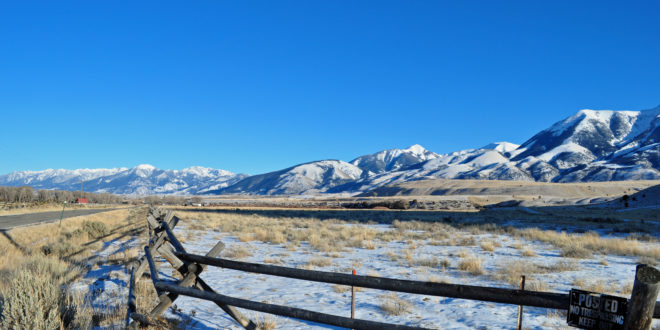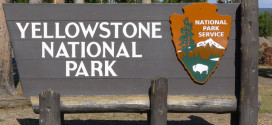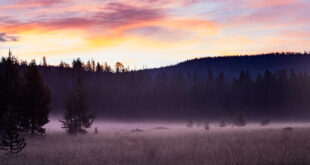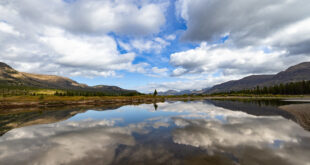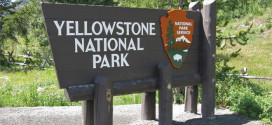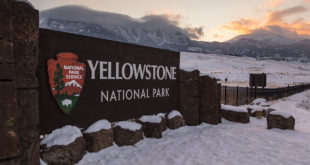After getting the go-ahead from the Montana environmental officials, Lucky Minerals Inc. could start drilling in the Paradise Valley by the end of the year.
Yesterday, we reported the Montana Department of Environmental Quality had signed off on Lucky’s plan to do exploratory drilling in Emigrant Gulch. According to DEQ Director Tom Livers, speaking to the Bozeman Daily Chronicle, the company “has agreed to mitigations beyond what is required in statute.” In particular, the company pledged to implement “extensive water quality and wildlife monitoring plans.”
The exploratory drilling does not mean Lucky Minerals will try to establish a mine in the region, but it is an important step in that direction.
Lucky Minerals is one of two companies looking to perform exploratory drilling on land north of Yellowstone. The other company, Crevice Mining Group LLC, has had its application rejected multiple times due to concerns from Montana DEQ officials.
Local opposition to both projects (especially the Crevice project) has been fierce, with conservationists and business owners (the Yellowstone Gateway Business Coalition) saying any mining would endanger the region’s ecosystem and the local economy, which is driven by outdoor recreation and proximity to Yellowstone National Park.
The news came the same day of a hearing for a bill aimed at curbing mining in the Paradise Valley. U.S. Senator Jon Tester (D-MT) secured a hearing for his “Yellowstone Gateway Protection Act,” which would withdraw 30,000 acres of public land from any mining claims. The land in question is under a temporary moratorium as of November 2016. From the Chronicle:
The bill, sponsored by Montana’s Democratic U.S. Sen. Jon Tester, had a hearing in front of a Senate committee on Wednesday. Colin Davis, the owner of Chico Hot Springs and one of the leaders of the Yellowstone Gateway Business Coalition, said the decision DEQ released on Wednesday makes that effort more important.
“It really underscores the urgency of getting this and getting it through,” Davis told the Chronicle’s editorial board Wednesday. “Now it gets real, and it gets dangerous for us.”
Permanently banning new claims on federal lands won’t impact the company’s immediate plans, though. With the approval, DEQ released an environmental analysis of the project that details the company’s plans.
The land Lucky intends to drill on is far up a rough Forest Service road, deep in the gulch. Mining occurred up there in the late 1800s and early 1900s, and companies have sporadically explored the area in the past few decades.
Lucky thinks it will be successful in finding something because it is going to drill deeper than any other company has. Lucky wants to drill as many as 46 holes somewhere between 1,000 and 2,000 feet into the hillside in that narrow gulch. It plans to drill during two shifts, and the project is expected to disturb fewer than five acres of land.
Some of the protections the company has agreed to include setbacks from the East Fork of Emigrant Creek and monitoring water quality on the stream. Employees will have to undergo training for how to deal with wildlife, and the company will have to develop a plan for what to do with its garbage so animals like grizzly bears don’t start digging through it.
The company has also agreed to use the Old Cemetery Road instead of driving past Chico Hot Springs.
DEQ will now work on calculating what a reclamation bond will be. Lucky has to pay that bond in cash before any work can be done. Then, Lucky will start talking with Park County and the Forest Service about obtaining permission to use the roads to their site.
According to Lucky Minerals Inc. vice president Shaun Dykes, the company expects to have the bond paid in a few weeks, calling approval from the Montana DEQ “one hurdle done.” The Chronicle reports the company has already hired a geologist and a PR team.
As mentioned, any mine would likely need access to more land beyond the current claims—hence interest in proposals like Tester’s bill. Indeed, nearly all of Montana’s Congressional presence (U.S. Senator Steve Daines, U.S. Congressman Greg Gianforte, Interior Secretary Ryan Zinke) has spoken out against mining in the Paradise Valley.
Indeed, at yesterday’s hearing, Daines spoke favorably of a withdrawal—but did not explicitly endorse Tester’s bill, citing concerns about property rights.
Potentially, however, Tester and Daines could reach a consensus to push the bill (or one like it) forward.
 Yellowstone Insider Your Complete Guide to America's First National Park
Yellowstone Insider Your Complete Guide to America's First National Park
